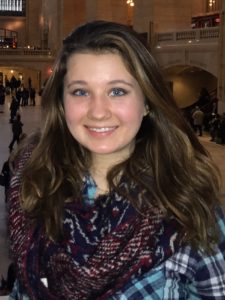Name: Weronika Kaczmarczyk
E-mail: wkaczmar@nd.edu
Language: Russian
Location of Study: Moscow, Russia
Program of Study: Arizona in Russia
Sponsors: Center for the Study of Languages and Cultures and Nanovic Institute of European Studies
Blog URL: http://sites.nd.edu/sla2016/author/wkaczmar/
A brief personal bio:
My name is Weronika and I am a rising junior in the Program of Liberal Studies and International Economics in Russian. I hope to work in a field that allows me to marry my interests in Russian and Slavic language/literature/culture with a more computational element in the private sector. Among my passions are traveling, skiing, and trying new foods. As my trip to Russia will be in July, I am thrilled to have the opportunity to satisfy two of those areas!
Why this summer language abroad opportunity is important to me:
The ability to study in Moscow on an SLA Grant will make a tremendous difference in the breadth of my Russian vocabulary and fluency. Because my eventual goal is to be fluency, the SLA is critical to realizing this. In completing my time as an undergraduate, Russian proficiency will be invaluable in allowing me to thrive in language and literature courses necessary for my International Economics major. A better understanding of the grammar will also make writing my senior thesis a more enriching experience because I will have greater access to resources that may be written in Russian.
Beyond Notre Dame, I plan to continue my study of Russian and other Slavic languages so that I may incorporate this geographical/cultural/linguistic region into my professional life either through direct travel or as a domestic contact with cultural and language competency.
What I hope to achieve as a result of this summer study abroad experience:
The primary goal of my experience abroad will be to gain language proficiency. Having completed two years of language study at ND, I feel that it is necessary to immerse myself in the language and culture to truly make further progress. The previous four semesters have laid the grammatical groundwork for me to function in a new city, but I anticipate that adjusting to the pace and diction of native speakers will be challenging. This is a welcome challenge, as it will allow me to be more successful in subsequent coursework in Russian upon my return. In addition to the profound language-acquisition opportunities of studying in Moscow, I will take this time to learn more about Russian culture and perspectives from natives to build a multi-faceted view of global issues and ideas. This will be especially important for moment forward with my coursework in Economics, as I plan to take electives with an economic focus.
My specific learning goals for language and intercultural learning this summer:
- By the end of the summer, I will be able to hold meaningful conversations with native Russians on a range of subjects.
- By the end of the summer, I will be able to confidently navigate the city of Moscow and would be able to assist someone with directions.
- By the end of the summer, I will be more fluid in my speech and will have gained a more intuitive grasp of the grammar I am employing.
- By the end of the summer, I will have improved my pronunciation to more closely mirror that of native speakers, especially of the Russian ?, vowel reductions, and consonant clusters.
My plan for maximizing my international language learning experience:
The program I have selected does an excellent job incorporating language training into all aspects of the experience, from classroom instruction to cultural excursions. However, I also plan to utilize my free time to intensify the immersion. I have arranged to arrive in Russia about half a week before the program is set to begin. This will allow me to acquaint myself with the city of Moscow, practice my language by purchasing necessities such as a local phone, and explore my surroundings more freely before I have the added responsibility of coursework to complete. Once classes begin, I plan to use my professors as a resource regarding the many pronunciation questions that I am sure will arise. For questions about colloquialisms and slang, I will do my best to gravitate toward Russian university students, or any locals I meet on my excursions. The key to making the most of my experience in Russia will be to listen intently to my Russian counterparts and to not be afraid to step outside of my comfort zone when using the language.
